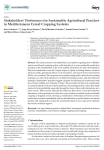Calatrava J., Álvaro-Fuentes J., Martinez-Granados D., Franco-Luesma S., Gómez-López M.D. (2025). Stakeholders’ preferences for sustainable agricultural practices in Mediterranean cereal cropping systems. Sustainability, 01/05/2025, vol. 17, n. 9,
https://doi.org/10.3390/su17094219
https://doi.org/10.3390/su17094219
| Titre : | Stakeholders’ preferences for sustainable agricultural practices in Mediterranean cereal cropping systems (2025) |
| Auteurs : | J. Calatrava ; J. Álvaro-Fuentes ; D. Martinez-Granados ; S. Franco-Luesma ; M.D. Gómez-López |
| Type de document : | Article |
| Dans : | Sustainability (vol. 17, n. 9, May 2025) |
| Langues : | Anglais |
| Langues du résumé : | Anglais |
| Catégories : |
Catégories principales 06 - AGRICULTURE. FORÊTS. PÊCHES ; 6.4 - Production Agricole. Système de ProductionThésaurus IAMM CEREALICULTURE ; CEREALE ; PRATIQUE AGRICOLE ; DURABILITE ; PARTIE INTERESSEE ; ACTEUR ; ESPAGNE |
| Résumé : | This study assesses local stakeholders' perceptions regarding how a Mediterranean cereal-based cropping system could transition to a more sustainable production, focusing on the identification of the most suitable alternatives for their diversification. Fifty-four stakeholders from the Aragon region in Spain, including farmers, technical advisors, public agricultural officers, local researchers, and experts from environmental NGOs, were consulted. Their responses were analysed using multi-criteria decision-making techniques to order their preferences for different farming practices and diversification strategies. Stakeholders? responses suggest a priority for balancing soil conservation with the economic viability and continuity of farms. This is evident not only in its consideration as a priority objective but also in their preferences for farming practices, where their implications for farm profitability, especially through the choice of less costly alternatives, are a main concern. This economic rationale also influences their choice of crop diversification alternatives, with a preference for short (two-year) rotations in rainfed cereals and double cropping in irrigated cereals, showing a consideration of the balance between environmental and economic sustainability, and for diversification crops that farmers are already familiar with, aiming both to reduce the uncertainties linked to new crops and to minimise the need for technical support. |
| Cote : | En ligne |
| URL / DOI : | https://doi.org/10.3390/su17094219 |







